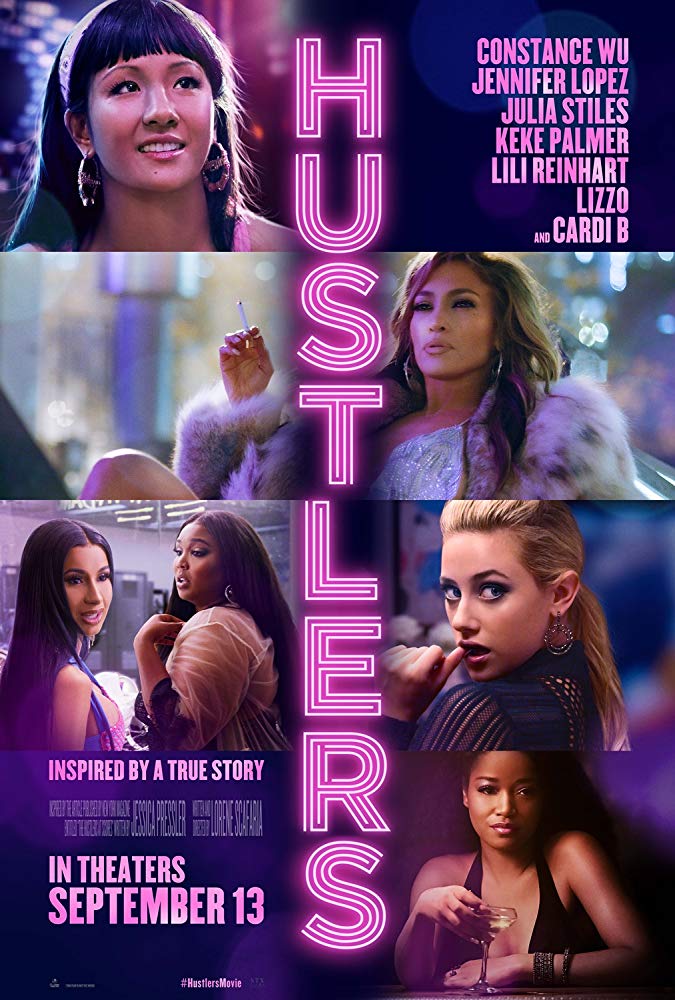 Can/will Hustlers appeal to both men and women? I’m not sure. It’s a film about friendship and sisterhood, payback and… pole dancing. A stimulating crime drama served up with a side of T&A. And yes, it’s a perfect vehicle for Jennifer Lopez (Second Act, Maid in Manhattan) to showcase her assets. Does her performance live up to all the hype about a potential Oscar nom? I wouldn’t go that far – at least not yet. It’s way too early in awards season, with many strong movies and performances likely to emerge. Lopez does work the pole – and the drama – with a tremendous amount of flexibility and flair. But Hustlers itself is not an OSCAR movie. It’s like The Wolf of Wall Street meets Striptease (Demi Moore worked the pole in that rather forgettable flick from 1996). Hustlers includes the standard elements of most ‘true crime’ dramas: Money. Greed. Sex. Drugs. Excess. Revenge. Friendship. Betrayal. It also has shades of Magic Mike, i.e. there’s more to the movie than meets the eye(candy). The main characters have some depth.
Can/will Hustlers appeal to both men and women? I’m not sure. It’s a film about friendship and sisterhood, payback and… pole dancing. A stimulating crime drama served up with a side of T&A. And yes, it’s a perfect vehicle for Jennifer Lopez (Second Act, Maid in Manhattan) to showcase her assets. Does her performance live up to all the hype about a potential Oscar nom? I wouldn’t go that far – at least not yet. It’s way too early in awards season, with many strong movies and performances likely to emerge. Lopez does work the pole – and the drama – with a tremendous amount of flexibility and flair. But Hustlers itself is not an OSCAR movie. It’s like The Wolf of Wall Street meets Striptease (Demi Moore worked the pole in that rather forgettable flick from 1996). Hustlers includes the standard elements of most ‘true crime’ dramas: Money. Greed. Sex. Drugs. Excess. Revenge. Friendship. Betrayal. It also has shades of Magic Mike, i.e. there’s more to the movie than meets the eye(candy). The main characters have some depth.
Hustlers is based on the true story of a group of strippers who really did bilk a bunch of mostly rich ‘Wall Street guys’ out of tons of cash with a fishing and fleecing scheme that sometimes involved drugging their marks with a concoction of ketamine and MDA (aka Molly). Take the drugging out of the equation and the implication is that these guys were generally a-holes who sort of deserved it. Maybe, maybe not. That part doesn’t really matter so much in this movie. Hustlers is all about the women and their motivations and mindset, with the primary focus on the relationship between mastermind Ramona (Lopez) and her protégé Destiny (Constance Wu, Crazy Rich Asians). Keke Palmer as Mercedes and Lili Reinhart as Annabelle round out the posse, and they are both great in their supporting roles.
The movie is directed by Lorene Scafaria who also penned the screenplay, inspired by an article published in New York magazine in 2015. The article by Jessica Pressler (a proxy of whom is portrayed by Julia Stiles in the film) spins the scheme as a “modern Robin Hood story” but the women aren’t exactly spreading the wealth. They spend a lot of it on themselves. The gist, however, is that the women were merely turning the tables on grubby and greedy men who doled out dollar and hundred-dollar bills with reckless abandon before the stock market crash of 2008. When the men stopped frequenting the clubs, the women lost their livelihoods. They had to find some way to make ends meet, especially since their work experience didn’t always resonate with hiring managers out in the real world. The fishing scheme seemed like a good idea at the time. Until a couple of victims found the balls to come forward and the police came a-calling. As did Hollywood.

